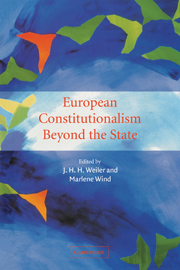Book contents
- Frontmatter
- Contents
- Notes on contributors
- Introduction: European constitutionalism beyond the state
- Part I
- Part II
- 2 Postnational constitutionalism and the problem of translation
- 3 The unfinished constitution of the European Union: principles, processes and culture
- 4 Europe and the constitution: what if this is as good as it gets?
- 5 The European Union as a polycentric polity: returning to a neo-medieval Europe?
- Part III
- Epilogue: europe and the dream of reason
- Index
3 - The unfinished constitution of the European Union: principles, processes and culture
Published online by Cambridge University Press: 26 June 2009
- Frontmatter
- Contents
- Notes on contributors
- Introduction: European constitutionalism beyond the state
- Part I
- Part II
- 2 Postnational constitutionalism and the problem of translation
- 3 The unfinished constitution of the European Union: principles, processes and culture
- 4 Europe and the constitution: what if this is as good as it gets?
- 5 The European Union as a polycentric polity: returning to a neo-medieval Europe?
- Part III
- Epilogue: europe and the dream of reason
- Index
Summary
Introduction
How can we best conceive of the European Union (EU) constitution? In my view it is essential to try to elaborate a conception of the EU constitution which engages with the concerns, not only of the elite, but also of ordinary citizens. I suggest that an adequate conception of the EU constitution requires systematic attention to its social, economic, political and cultural contexts. Consequently, this chapter seeks to sketch a model of the EU constitution that takes account of the various contexts that produce EU law and shape its operation in practice. To facilitate this task, it is useful first to circumscribe the object of inquiry, to define the term ‘constitution’, and to identify some ways in which the EU constitution has so far been conceived.
Most work so far has either focused solely on the EC or, though concerned with the EU, lamented the fact that, in contrast to its predecessor, it could no longer be understood in constitutional terms. In contrast, partly in view of the past history of European integration, but even more because of its future, I suggest that we should be concerned with the EU, not only the EC, for two reasons. On the one hand, nowadays it is difficult, if not impossible, to understand EC law from the technical legal standpoint except in the broader legal context of the EU.
- Type
- Chapter
- Information
- European Constitutionalism beyond the State , pp. 55 - 73Publisher: Cambridge University PressPrint publication year: 2003
- 3
- Cited by



